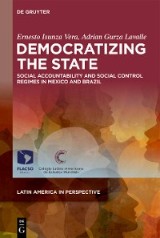Details

Democratizing the State
Social Accountability and Social Control Regimes in Mexico and BrazilISSN 1. Aufl.
|
94,95 € |
|
| Verlag: | De Gruyter |
| Format: | EPUB |
| Veröffentl.: | 04.11.2024 |
| ISBN/EAN: | 9783111062853 |
| Sprache: | englisch |
| Anzahl Seiten: | 168 |
DRM-geschütztes eBook, Sie benötigen z.B. Adobe Digital Editions und eine Adobe ID zum Lesen.
Beschreibungen
<p>Democratic institution-building experiences, innovative forms of social organization, and the development of multiple state-society interfaces represent a significant political phenomenon in Latin America in the last half-century. By comparing the two largest countries of the subcontinent, Brazil and Mexico, <em>Democratizing the State</em> examines social accountability and social control regimes. </p>
<p>These regimes are conceived configurations of relationships between actors, organizational structures, norms, and resources, all arranged in a stable and institutionalized manner to exert social control over state actors and functions. The book addresses the contrasting characteristics and different functions through which the citizenry and civil society exert control over state action in both countries. Characterizing these experiences broadly as regimes is novel and enlightening regarding the work of practitioners and scholars on political participation, social accountability, and democracy in the global South and the global North. </p>
<ol>
<p></p>
</ol>
<p>These regimes are conceived configurations of relationships between actors, organizational structures, norms, and resources, all arranged in a stable and institutionalized manner to exert social control over state actors and functions. The book addresses the contrasting characteristics and different functions through which the citizenry and civil society exert control over state action in both countries. Characterizing these experiences broadly as regimes is novel and enlightening regarding the work of practitioners and scholars on political participation, social accountability, and democracy in the global South and the global North. </p>
<ol>
<p></p>
</ol>
<strong></strong>
<p><strong>Ernesto Isunza Vera</strong> is a research professor at the Centre for Research and Higher Studies in Social Anthropology (CIESAS, Mexico) and associate researcher at Centre for Metropolitan Studies (CEM, Brazil) and at the National Institute of Science and Technology Transformation of Participation, Associationalism, and Contentious Politics (INCT Participa). </p>
<strong></strong>
<p><strong>Adrian Gurza Lavalle</strong> is an Associate Professor in the Political Science Department at the University of São Paulo, President of the Brazilian Center for Analysis and Planning (Cebrap), Coordinator of the National Institute of Science and Technology Transformation of Participation, Associationalism, and Contentious Politics (INCT Participa), and Vice Director of the Centre for Metropolitan Studies (CEM). He is also a fellow researcher at Cebrap, INCT Participa, and CEM. </p>
<p><strong>Ernesto Isunza Vera</strong> is a research professor at the Centre for Research and Higher Studies in Social Anthropology (CIESAS, Mexico) and associate researcher at Centre for Metropolitan Studies (CEM, Brazil) and at the National Institute of Science and Technology Transformation of Participation, Associationalism, and Contentious Politics (INCT Participa). </p>
<strong></strong>
<p><strong>Adrian Gurza Lavalle</strong> is an Associate Professor in the Political Science Department at the University of São Paulo, President of the Brazilian Center for Analysis and Planning (Cebrap), Coordinator of the National Institute of Science and Technology Transformation of Participation, Associationalism, and Contentious Politics (INCT Participa), and Vice Director of the Centre for Metropolitan Studies (CEM). He is also a fellow researcher at Cebrap, INCT Participa, and CEM. </p>

















